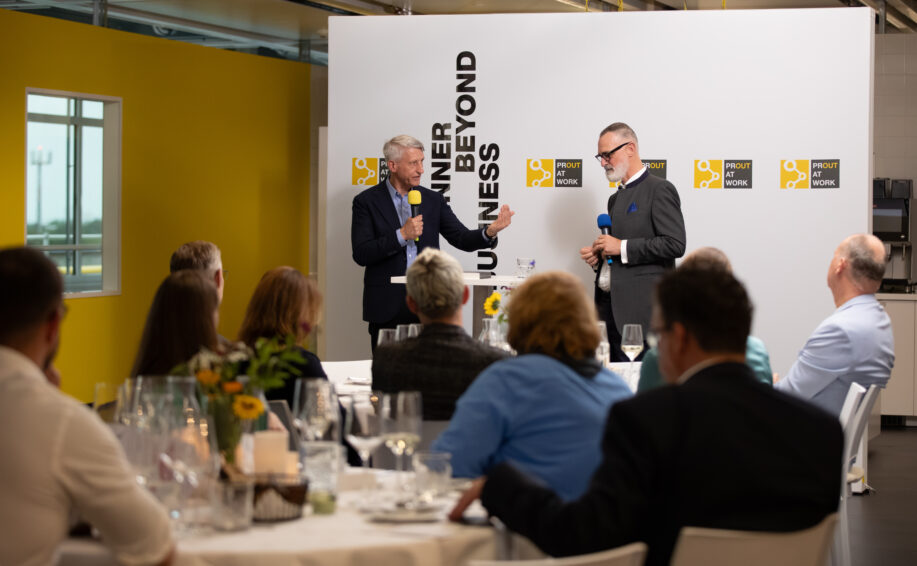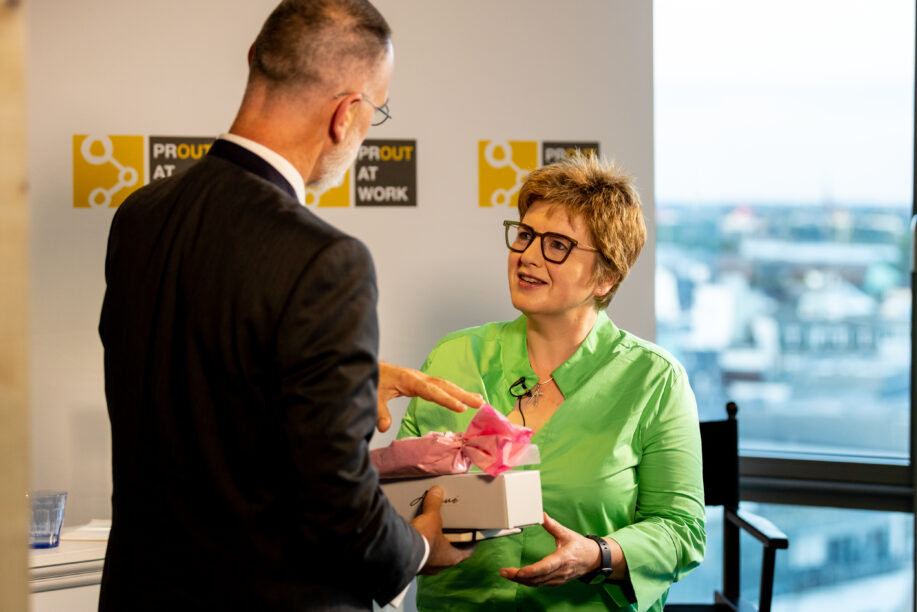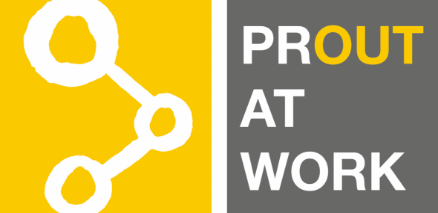
Sander van’t Noordende
“SENIOR LEADERS AND CEOS IN PARTICULAR MUST STAND UP AND SHOW THEIR SUPPORT, BECAUSE THEY ARE THE FOCUS OF THE COMPANY AND ACT AS ROLE MODELS.”
Queer equal opportunities will continue to be an important topic in 2024 – especially in times when we are seeing an increase in queer-hostile activities. It is important for individuals, who are thus gaining more and more freedom to live their authentic selves in the workplace, and just as important for companies that offer their employees an appreciative environment.
Albert Kehrer, CEO of PROUT AT WORK, also emphasized in his opening speech why queer diversity in the workplace is so important: “Queer diversity is considered an indicator of an open and inclusive corporate culture.”
At the PROUT AT WORK Foundation’s 7th DINNER BEYOND BUSINESS, the focus was on the commitment of companies and managers to queer employees: “In times when hatred, hate speech and crime against queer people are on the rise again, IKEA is standing up as an ally and strong supporter. We have a zero-tolerance policy for attacks on queer people inside and outside the company. I am pleased and proud that many people from the queer community find their professional home at IKEA,” says Walter Kadnar, Country Retail Manager & CSO IKEA Germany. The invitation to DINNER BEYOND BUSINESS 2024 was accepted by over 50 senior executives from major companies and institutions, including representatives from Accenture, Boehringer Ingelheim, Commerzbank, congstar, Disney, Ergo, Infineon, KPMG, Novelis, Oracle, OTTO, PwC and Siemens. The participants of the top-class networking event enjoyed an exclusive dinner at the IKEA headquarters in Hofheim am Taunus. Albert Kehrer explained the background to DINNER BEYOND BUSINESS in his welcoming speech: “Behind a manager there is always a personal story that has an impact on performance in the workplace. That’s why we invited people to DINNER BEYOND BUSINESS 2024 to find out more about the queer side of business. Supporting queer people in the workplace is much more than just supporting a marginalized group.” The highlight of the evening was the Fireside Chat by Albert Kehrer together with Sander van’t Noordende, CEO of Randstad, about role models, coming out at work and allyship.
“For us at Randstad, our ultimate goal is for everyone to feel comfortable at work.”
Sander van’t Noordende has been Chief Executive Officer and Chairman of the Board at Randstad since March 2022 and is one of the only openly gay CEOs among the Fortune 500. Sander spent most of his career at Accenture, where he held a number of leadership positions. During his successful three decades at Accenture, he served as Group Chief Executive of the Products Operating Group. Sander advocates for the importance of DEI&B in the workplace at international events, including at the World Economic Forum in Davos with discussions on inclusion and the rights of queer people.
“All employees should have the same opportunities – but that also means that we have to organize our processes and those of our customers accordingly.”
At the beginning of the Fireside Chat, Sander van’t Noordende shared some private insights as an out executive: “I come from a very diverse family: I have two gay uncles and two lesbian aunts, which has always been the most normal thing in the world for me. But a diverse family doesn’t automatically mean it’s easy to come out as gay.” His role model has always been his gay uncle, who showed him that you can also be successful at work as a gay man. “For us at Randstad, our ultimate goal is for everyone to feel comfortable at work. All employees should have the same opportunities – but that also means that we have to organize our processes and those of our customers accordingly.” He is also convinced that companies need to position themselves on certain issues: “Senior leaders and CEOs in particular need to stand up and show their support, because they are the focus of the company and act as role models.”
recording of the talk with sander van’t noordende

Margot Slattery
“Queer people make up 10 to 11 percent of society. Our lives do not just happen in one particular month.”
We often hear that queer people are just a minimal part of our society. So why bother advocating for the LGBT*IQ community outside of Pride Month? Simple: because the truth is different. Queer people make up a much larger portion of society than some might think, a full 10 to 11 percent. Due to a lack of representation and visibility, as well as fear of negative consequences, many queer people still do not dare to come out in the workplace. So did the keynote speaker at the fifth DINNER BEYOND BUISNESS, Margot Slattery, for much of her career. In a face-to-face conversation with Albert Kehrer, she shared how her coming out has impacted herself and others, and the importance of leadership engagement for queer employees.
After a two-year break due to the pandemic, the PROUTATWORK Foundation was finally able to organize the DINNER BEYOND BUSINESS again. For the fifth time, more than 35 senior executives from major German and international business companies and institutions met – this time at Google’s headquarters in Hamburg. Among them were representatives from Accenture, BASF, Clifford Chance, Commerzbank AG, Ernst & Young, KPMG, LaSalle, Linde, PricewaterhouseCoopers, Sandoz, Sodexo and UniCredit. With a beautiful view and sunny weather, the participants of the information and networking event enjoyed an exclusive dinner in an informal atmosphere. The highlight of the event was the 45-minute talk with keynote speaker Margot Slattery, which focused on the importance of the commitment of companies and their executives to the LGBT*IQ community..
“Visibility of outed leaders is hugely important because it makes the company a safe space for queer people.”
At the beginning of the talk, Margot Slattery gave private insights into her professional career. She described her outing as a personal liberating blow, because for the first half of her professional life she was not yet outed as a lesbian and therefore could not be as free and productive as she was able to be in the second half of her career. However, Margot feels that her coming out was not only a liberating blow for herself, but also a duty, because it allowed her to serve as a role model for colleagues. In this context, the speaker also speaks of the enormous importance of Allys, because it is not enough to “just” tolerate. Queer people need supporters who fight alongside them for an open society. According to Slattery, it is the duty of management to promote diversity in professional life, both internally and externally, for example by supporting NGOs.
“We must not let up, we must continue to show continuous commitment – not only during Pride Month. Because: tolerance, acceptance and freedom don’t happen overnight.”
Finally, Margot Slattery summarizes that a lot has already happened in terms of diversity and inclusion, but warns against resting on our laurels. If we do not continue to fight consistently and loudly, we will come to a standstill or, in the worst case, even regress.
